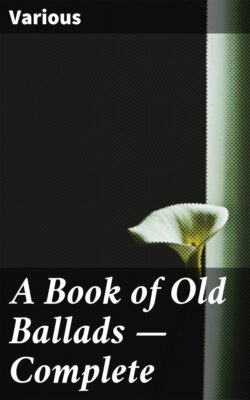Читать книгу A Book of Old Ballads — Complete - Various - Страница 11
На сайте Литреса книга снята с продажи.
VII
ОглавлениеTable of Contents
"Tipperary" is a true ballad, which is why it is included in this book.
So is "John Brown's Body". They were not written as ballads but they
have been promoted to that proud position by popular vote.
It will now be clear, from the foregoing remarks, that there are
thousands of poems, labelled "ballads" from the eighteenth century,
through the romantic movement, and onwards, which are not ballads at
all. Swinburne's ballads, which so shocked our grandparents, bore about
as much relation to the true ballads as a vase of wax fruit to a
hawker's barrow. They were lovely patterns of words, woven like some
exquisite, foaming lace, but they were Swinburne, Swinburne all the
time. They had nothing to do with the common people. The common people
would not have understood a word of them.
Ballads must be popular. And that is why it will always remain one of the weirdest paradoxes of literature that the only man, except Kipling, who has written a true ballad in the last fifty years is the man who despised the people, who shrank from them, and jeered at them, from his little gilded niche in Piccadilly. I refer, of course, to Oscar Wilde's "Ballad of Reading Gaol." It was a true ballad, and it was the best thing he ever wrote. For it was written de profundis, when his hands were bloody with labour and his tortured spirit had been down to the level of the lowest, to the level of the pavement … nay, lower … to the gutter itself. And in the gutter, with agony, he learned the meaning of song.
Ballads begin and end with the people. You cannot escape that fact. And
therefore, if I wished to collect the ballads of the future, the songs
which will endure into the next century (if there is any song in the next century), I should not rake through the contemporary poets, in the hope of finding gems of lasting brilliance. No. I should go to the music-halls. I should listen to the sort of thing they sing when the faded lady with the high bust steps forward and shouts, "Now then, boys, all together!"
Unless you can write the words "Now then, boys, all together", at the
top of a ballad, it is not really a ballad at all. That may sound a
sweeping statement, but it is true.
In the present-day music-halls, although they have fallen from their
high estate, we should find a number of these songs which seem destined
for immortality. One of these is "Don't 'ave any more, Mrs. Moore."
Do you remember it?
Don't 'ave any more, Mrs. Moore!
Mrs. Moore, oh don't 'ave any more!
Too many double gins
Give the ladies double chins,
So don't 'ave any more, Mrs. Moore!
The whole of English "low life" (which is much the most exciting part of
English life) is in that lyric. It is as vivid as a Rowlandson cartoon.
How well we know Mrs. Moore! How plainly we see her … the amiable,
coarse-mouthed, generous-hearted tippler, with her elbow on countless
counters, her damp coppers clutched in her rough hands, her eyes
staring, a little vacantly, about her. Some may think it is a sordid
picture, but I am sure that they cannot know Mrs. Moore very well if
they think that. They cannot know her bitter struggles, her silent
heroisms, nor her sardonic humour.
Lyrics such as these will, I believe, endure long after many of the most
renowned and fashionable poets of to-day are forgotten. They all have
the same quality, that they can be prefaced by that inspiring sentence,
"Now then, boys--all together!" Or to put it another way, as in the
ballad of George Barnwell,
All youths of fair England
That dwell both far and near,
Regard my story that I tell
And to my song give ear.
That may sound more dignified, but it amounts to the same thing!
